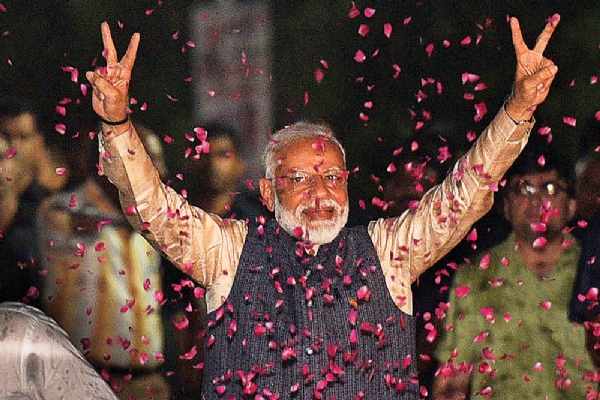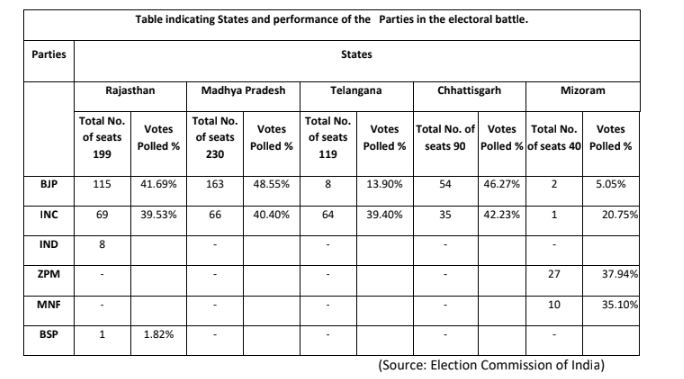Modi wins semi-final: It's meaning
Modi , an unprecedented personality with great stamina and vision with an unstoppable mission to rejuvenate the ancient culture of Bharat which was hitherto shadowed by several invaders who tried to destroy the indigenous culture.
Total Views |
The political dust storm that had kept the political society in Bharat , quite busy at all levels in general and the five states in particular where general elections were slated to be held, a threat of unease and uncertainty of the future, which at times looked like furiously shaking the democratic fabric, has at last been settled down on 4th December 2023.

Heated dialogues , abusing each other, minor angry exchanges and a few other human facets exhibited, were a few ugly features of the electoral battle.:
It is very interesting to note that the discussions which prevailed in almost all the channels and the participants were unanimous in concluding that the INDIA alliance and esp. the frontrunner Congress party would sweep the polls and Modi would be nowhere in the field. Once this was achieved we will casually and without much efforts would displace the incumbent, everybody seemed confident.
The mischievous media effectively created an atmosphere which made the people believe that the end of Modi was nearing closer. Popular faces , self-proclaimed political commentators and learned analysts who preceding weeks together were seen on the tele-screens announcing their pre-counting results , had become eager on the counting day i.e. December, the 3rd 2023, to witness the end of the Modi era with great joy.
But that was not to happen. Voters had something else in their mind. All those who were self announced judges , had no answer to submit or offer any comment except their fallen faces on the screen.
The successful outcome of the democratic practices in the battle was as follows :

How the media esp. the electronic media behaved during the campaign, is a matter of great concern. Besides the baseless statements in the deliberations and misuse of statistical methods wielding it as a weapon to misguide the voters, warrants a necessity of some sort of statutory regulation defining the scope of freedom of speech and liberty of electronic print expression. Is it the way ,the fourth estate is expected to discharge its function ? ( It is interesting to note that there is not a single reference made to the role of a political party in the Constitution of Bharat )
Ventilation of personal animosity cannot be a cause for media unleashing its terror to gag the vocal opponents. In such cases media does not merely gag the opponents , but it incites violence and creates uneasy law and order situations by publishing misleading news lines.
It will not be an exaggeration to state that the media seems to be more dangerous than the working of the political parties. An important factor to remember isthat media literacy becomes a pre-condition for a competent political society .
It is interesting to note the following :
Media contain ideological and value messages. Media literacy involves an awareness of the ideological implications and value systems of media texts. All media products are advertising in some sense - for themselves, but also values or ways of life. They usually affirm the existing social system by following: the nature of "the good life" and the role of affluence in it, the virtues of "consumerism," the proper role of women, the acceptance of authority, and unquestioning patriotism. We need to use decoding techniques in order to uncover these ideological messages and value systems.
( Source : Quoted from Media Literacy Resource Guide. Ontario Ministry of Education, 1989. pp. 8-9.)
Furthermore, where does the Bhartiya media fit itself in the following five principles laid down by the Foreign
Media Association :
Prime Minister Narendra Modi , an unprecedented personality with great stamina and vision with an unstoppable mission to rejuvenate the ancient culture of Bharat which was hitherto shadowed by several invaders who tried to destroy the indigenous culture. All of these miserably failed. Because the Bharatiya culture is like an octopus , it does not repulse the foreign element, but it successfully gulps it.
Another important feature is that despite the well known golden era of the ancient Bharat , the present is insensitive to this factor. Invaders have been invading Bharatiya nation and her culture for the last thousand years. Prime Minister Modi is perhaps the first one who is trying to reconnect the present with the past with great pride. In a short span of a decade Modi pushed Bharat to the top and reserving an unbeatable , unshakable space for herself on her own,and not at somebody’s mercy aimed at growing into the position of “Vishwguru”.
Modi made it possible since he succeeded in establishing political continuity, political stability and civilian supremacy in Bharat. Moreover, it became possible since Modi is an embodiment of sincerity, nationalist attitude and commitment.
It is anybody’s guess that Modi is in the final and champion in 2024. The world will know Narendra Modi as the mood of Bharat.
.
.


